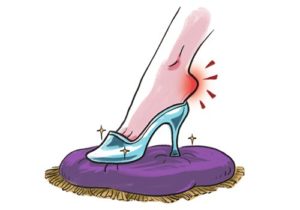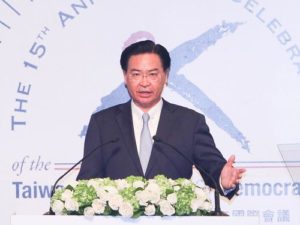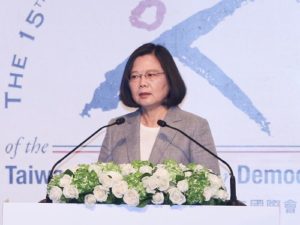Western-style multi-party democracy is inappropriate for Asia, the Chinese state-controlled Global Times said Monday. An op-ed titled “Multi-Party System Misfit in Asian Nations” suggests that pluralist democracy is inherently divisive, and that polarization generates corruption and sectarianism.

Credit: Liu Rui/GT
“South Korea, Thailand, the Philippines and Malaysia have implemented the Western political model for more than half a century and it is hard to say that their politics is not adequately Westernized,” said the editorial, illustrated with a cartoon of a foot failing to fit into a Cinderella-style slipper. “More importantly, with the Western multi-party democracy developing in these countries for decades, their politics has been intensely polarized.”
“In some Asian countries and regions with the Western democratic models, leaders go to prison after transferring power,” it adds. “Is it because these countries have yet to assimilate Western multi-party democracy or the same system is dividing their politics?”
 The claim came as a must-read report exposing the case of a Sri Lankan port as “one of the most vivid examples of China’s ambitious use of loans and aid to gain influence around the world — and of its willingness to play hardball to collect,” appeared in the New York Times:
The claim came as a must-read report exposing the case of a Sri Lankan port as “one of the most vivid examples of China’s ambitious use of loans and aid to gain influence around the world — and of its willingness to play hardball to collect,” appeared in the New York Times:
The debt deal also intensified some of the harshest accusations about President Xi Jinping’s signature Belt and Road Initiative: that the global investment and lending program amounts to a debt trap for vulnerable countries around the world, fueling corruption and autocratic behavior in struggling democracies….
During the 2015 Sri Lankan elections, large payments from the Chinese port construction fund flowed directly to campaign aides and activities for [then President Mahinda] Rajapaksa, who had agreed to Chinese terms at every turn and was seen as an important ally in China’s efforts to tilt influence away from India in South Asia.
![]() The threat to democracy and global liberal norms posed by Beijing’s sharp power was a focus of discussion as activists from several countries gathered in Taipei on Monday to discuss strategies to defend democracy and celebrate the 15th anniversary of the Taiwan Foundation for Democracy (TFD), Taiwan News reports:
The threat to democracy and global liberal norms posed by Beijing’s sharp power was a focus of discussion as activists from several countries gathered in Taipei on Monday to discuss strategies to defend democracy and celebrate the 15th anniversary of the Taiwan Foundation for Democracy (TFD), Taiwan News reports:
Established in 2003 as the first national democracy assistance foundation in Asia, the TFD hosted a forum titled “Global Solidarity of Democracy in Taiwan” to celebrate the occasion, accompanied by an exhibition on the pursuit of democracy and freedom by Taiwan’s people going back to the Japanese colonial period.
 Joseph Wu (left), Taiwan’s foreign affairs minister, said that the TFD has played a crucial role in educating the public about democratic values….Taiwan is looking to connect with the international community on every front to continue to contribute its strengths, Wu said, asserting that “democratic Taiwan is a stumbling block in the way of expanding authoritarian power.”
Joseph Wu (left), Taiwan’s foreign affairs minister, said that the TFD has played a crucial role in educating the public about democratic values….Taiwan is looking to connect with the international community on every front to continue to contribute its strengths, Wu said, asserting that “democratic Taiwan is a stumbling block in the way of expanding authoritarian power.”
 Despite the threats emanating from Beijing, Taiwan’s democracy will not regress, President Tsai Ing-wen (right) told the forum Tuesday, noting that Freedom House scored Taiwan 93 out of 100 in its 2018 Freedom in the World report, two points higher than last year. Transitional justice is the last mile on Taiwan’s journey of democratization and last month’s inauguration of the Transitional Justice Commission was “a big stride” in the right direction, she added.
Despite the threats emanating from Beijing, Taiwan’s democracy will not regress, President Tsai Ing-wen (right) told the forum Tuesday, noting that Freedom House scored Taiwan 93 out of 100 in its 2018 Freedom in the World report, two points higher than last year. Transitional justice is the last mile on Taiwan’s journey of democratization and last month’s inauguration of the Transitional Justice Commission was “a big stride” in the right direction, she added.
 China represents the greatest threat to democratic norms, said Carl Gershman, (left), president of the Washington-based National Endowment for Democracy. Japan, South Korea and others are deeply concerned about Beijing’s challenges to the liberal order, he added.
China represents the greatest threat to democratic norms, said Carl Gershman, (left), president of the Washington-based National Endowment for Democracy. Japan, South Korea and others are deeply concerned about Beijing’s challenges to the liberal order, he added.
President Tsai concurred, and urged other states to work with Taiwan in countering China’s expansionist aims and protecting shared liberal values.
“This is not just Taiwan’s challenge, it is a challenge for the region and the world as a whole, because today it’s Taiwan, but tomorrow it may be any other country that will have to face the expansion of China’s influence,” Tsai told AFP.
 “Their democracy, freedom, and freedom to do business will one day be affected by China,” she added. “We need to work together to reaffirm our values of democracy and freedom in order to constrain China and also minimize the expansion of their hegemonic influence.”
“Their democracy, freedom, and freedom to do business will one day be affected by China,” she added. “We need to work together to reaffirm our values of democracy and freedom in order to constrain China and also minimize the expansion of their hegemonic influence.”
“Civil society is the guarantee of democracy,” as it helps to develop democratic values and to promote political participation, Najet Zammouri of the Tunisian Human Rights League, told the TFD. The league was a member of the Tunisian National Dialogue Quartet that won the 2015 Nobel Peace Prize.
Dialogue and mutual learning is essential to strengthen democratic narratives, said Ivan Doherty, a senior associate at the Washington-based National Democratic Institute, who highlighted the importance of regional pro-democracy organizations.
“With the promotion of democracy, there is no beginning and no end. It is a continuous work in progress,” he said. “We must always be prepared for the long haul.”







